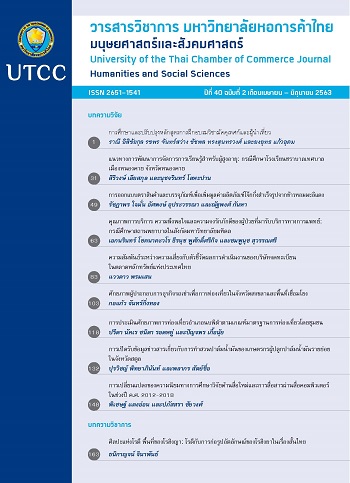The Study and Revision of the Tourist Guide and Tour Leader Training Courses
Main Article Content
Abstract
The study and revision of the tourist guide and tour leader training courses aimed to develop and revise the training courses for tourist guides and tour leaders in accordance with the Revised Law of Tour Operators and Tourist Guides as well as to satisfy the demand in the labor market, tour operators, and tourists. In this study, the data was collected from 31 key informants in tour operators and tourist guides and 400 stakeholders involved in the training courses selected by purposive sampling. The research tools for the data collection was an interview form and the drafted training courses for tour guides and tour leaders revised by the researcher. The study results showed that: 1) the content of the available training courses was not suitable to keep up with changing situations at the present. 2) The revision of the tourist guide and tour leader training courses was resulted as the 2018 revised training courses including General Tourist Guide Training Course, and the regional tourist guide training courses for four regions: The Northern Region Tourist Guide Training Course, The Northeastern Region Tourist Guide Training Course, The Central Region Tourist Guide Training Course, and The Southern Region Tourist Guide Training Course, and Tour Leader Training Course. In terms of the content structure, both general tourist guide training course and regional tourist guide training courses were consisted of general academic knowledge, regional academic knowledge, professional knowledge and skills, foreign language competency, field studies, and practical training with tour operators. The content of the tour leader training course was composed of general academic knowledge, professional knowledge and skill, foreign language competency, and practical training with tour operators.
Article Details
ลิขสิทธิ์ของบทความ
ผลงานที่ได้รับการตีพิมพ์ถือเป็นลิขสิทธิ์ของมหาวิทยาลัยหอการค้าไทย ห้ามมิให้นำเนื้อหา ทัศนะ หรือข้อคิดเห็นใด ๆ ของผลงานไปทำซ้ำ ดัดแปลง หรือเผยแพร่ ไม่ว่าทั้งหมดหรือบางส่วนโดยไม่ได้รับอนุญาตเป็นลายลักษณ์อักษรจากมหาวิทยาลัยหอการค้าไทยก่อน
References
กระทรวงศึกษาธิการ. (2553). ประกาศกระทรวงศึกษาธิการ เรื่อง มาตรฐานคุณวุฒิระดับปริญญาตรี สาขาวิชาการท่องเที่ยวและการโรงแรม พ.ศ. 2553. สืบค้นจาก http://www.mua.go.th/users/tqf-hed/news/FilesNews/FilesNews6/tourism_m1.pdf
กรมการท่องเที่ยว. (2551). พระราชบัญญัติธุรกิจนำเที่ยวและมัคคุเทศก์ พ.ศ. 2551. สืบค้นจาก https://www.dot.go.th/ebooks/ebooks-view/378
คณะกรรมการนโยบายการท่องเที่ยวแห่งชาติ. (2560). แผนพัฒนาการท่องเที่ยว ฉบับที่ 2 (พ.ศ.2560-2564). กรุงเทพฯ: สำนักงานกิจการโรงพิมพ์องค์การสงเคราะห์ทหารผ่านศึก.
ไชยปกรณ์ ป้องญาติ, และลินจง โพชารี. (2561). ศักยภาพมัคคุเทศก์ที่จะก่อให้เกิดความประทับใจหรือความชอบของนักท่องเที่ยวชาวเวียดนามในจังหวัดอุบลราชธานี ประเทศไทย. ใน การประชุมวิชาการ “มหาวิทยาลัยมหาสารคามวิจัย ครั้งที่ 14” (น. 174-180). มหาสารคาม: มหาวิทยาลัยมหาสารคาม, คณะมนุษยศาสตร์และสังคมศาสตร์.
ผะอบ พวงน้อย, นาตยา แก้วใส, สมชาติ เลิกบางพลัด, โปรดปราณ ชลสาคร, และอัจฉรา สังขยุทธ. (2558). การพัฒนาหลักสูตรและชุดสื่อการเรียนรู้เรื่องภาษาอังกฤษเทคนิคเพื่อการท่องเที่ยวเมืองไทยในวิถีพุทธ. วารสารวิชาการพระจอมเกล้าพระนครเหนือ, 25(1), 137-147.
ภัทรพล มหาขันธ์. (2550). การประเมินหลักสูตรระดับปริญญาตรี คณะศึกษาศาสตร์ สาขาการศึกษาตลอดชีวิต มหาวิทยาลัยศิลปากร. นครปฐม: มหาวิทยาลัยศิลปากร, คณะศึกษาศาสตร์.
มธุรดา เอี่ยมสุภา. (2558). การพัฒนาหลักสูตรฝึกอบรมด้านการท่องเที่ยวเชิงวัฒนธรรมเพื่อเตรียมความพร้อมการเข้าสู่ประชาคมอาเซียนสำหรับมัคคุเทศก์น้อยในจังหวัดสิงห์บุรี. กรุงเทพฯ: มหาวิทยาลัยเทคโนโลยีราชมงคลธัญบุรี, คณะครุศาสตร์อุตสาหกรรม.
มารุต พัฒผล. (2562). แนวคิดหลักการพัฒนาหลักสูตร. กรุงเทพฯ: ศูนย์ผู้นำนวัตกรรมหลักสูตรและการเรียนรู้.
รุ่งรัตน์ หัตถกรรม, วีรากร รัตกูล, กนกเกล้า แกล้วกล้า, ราเมศร์ พรหมชาติ, และนรินทร์ เจตธำรง. (2561). ความต้องการตลาดแรงงานเพื่อปรับปรุงหลักสูตรศิลปศาสตร์บัณฑิต สาขาวิชาอุตสาหกรรมท่องเที่ยวและโรงแรม คณะวิทยาการจัดการ มหาวิทยาลัยราชภัฏบุรีรัมย์. ใน การประชุมวิชาการระดับชาติและนานาชาติ ครั้งที่ 2 NIRC 2018 (น. 419-428). บุรีรัมย์: มหาวิทยาลัยราชภัฏบุรีรัมย์.
โรจนา ลิ้มสกุลวานิจ. (2552). คุณลักษณะของมัคคุเทศก์นำเที่ยวต่างประเทศที่พึงประสงค์ของนักท่องเที่ยวชาวไทย. กรุงเทพฯ: มหาวิทยาลัยราชภัฏธนบุรี, โครงการบัณฑิตศึกษา.
วิชัย วงษ์ใหญ่. (2554). เอกสารประกอบการสอน รายวิชาทฤษฎีการพัฒนาและเปลี่ยนแปลงหลักสูตร. กรุงเทพฯ: มหาวิทยาลัยศรีนครินทรวิโรฒ, บัณฑิตวิทยาลัย.
สงัด อุทรานันท์. (2532). พื้นฐานและหลักการพัฒนาหลักสูตร (พิมพ์ครั้งที่ 3). กรุงเทพฯ: โรงพิมพ์มิตรสหาย.
สจีวรรณ ทรรพวสุ. (2548). หลักสูตรและการจัดการศึกษาขั้นพื้นฐาน. กรุงเทพฯ: มหาวิทยาลัยราชภัฏสวนสุนันทา, คณะครุศาสตร์.
สำนักงานคณะกรรมการการอาชีวศึกษา. (2557). หลักสูตรประกาศนียบัตรวิชาชีพชั้นสูง พ.ศ. 2557 ประเภทวิชาอุตสาหกรรมท่องเที่ยว สาขาวิชาการท่องเที่ยว. สืบค้นจาก http://bsq2.vec.go.th/course/.pdf
สำนักงานปลัดกระทรวงการท่องเที่ยวและกีฬา. (2562). แถลงข่าวสถานการณ์ท่องเที่ยว ธันวาคม ปี 2561. สืบค้นเมื่อ 20 กันยายน 2562, จาก https://www.mots.go.th/old/ewt_dl_link.php?nid=11272
สุริยา ส้มจันทร์. (2554). การพัฒนาหลักสูตรฝึกอบรมมัคคุเทศก์ในพื้นที่เฉพาะ ตามกรอบมาตรฐานมัคคุเทศก์ของกระทรวงการท่องเที่ยวและกีฬาเพื่อส่งเสริมการท่องเที่ยวในชุมชน. มหาสารคาม: มหาวิทยาลัยมหาสารคาม, สาขาวิชาการจัดการการท่องเที่ยวและการโรงแรม.
อรจนา จันทรประยูร, วราภรณ์ ดวงแสง, อนุวัต เชื้อเย็น, วลัยลดา ถาวรมงคลกิจ, วัชรีวรรณ ศศิผลิน, และวิวัฒน์ ประสานสุข. (2554). การพัฒนาศักยภาพมัคคุเทศก์ท้องถิ่นในพื้นที่ตำบลป่าไผ่ อำเภอสันทราย จังหวัดเชียงใหม่. เชียงใหม่: มหาวิทยาลัยแม่โจ้.
The Authority on World Travel & Tourism. (2019). Travel & Tourism continues strong growth above global GDP. Retrieved September 20, 2019, from https://www.wttc.org/about/media-centre/press-releases/press-releases/2018/travel-tourism-continues-strong-growth-above-global-gdp/
Council on Higher Education. (2011). Work-integrated learning: Good practice guide. Retrieved September 20, 2019, from http://www.che.ac.za/sites/default/files/publications/Higher_Education_Monitor_12.pdf
Golding, C. (2005). Developing a thinking classroom: a workbook for Processional learning teams. Melbourne, Australia: Hawker Brownlow Education.
Good, C.V. (1973). Dictionary of education. New York: McGraw-Hill.
Oliva, P. F. (2009). Developing the Curriculum (7thed.). Boston, MA: Allyn and Bacon.
Saylor, J.G., & Alexander, W.M. (1981). Curriculum planning for better teaching and learning (4thed.) New York: Holt, Rinehart and Winston.
Taba, H. (1962). Curriculum development: Theory and practice. New York: Harcourt, Brace & World.
Tyler, R. W. (1949). Basic Principles of Curriculum and Instruction. Chicago, IL: The university of Chicago press.


